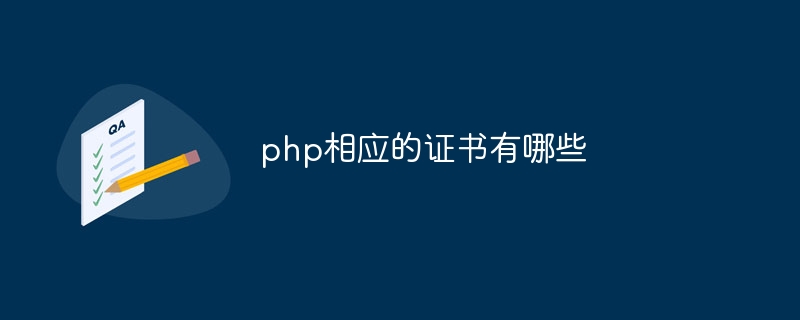Home >Backend Development >PHP Problem >What are the corresponding certificates for php?
What are the corresponding certificates for php?
- 百草Original
- 2023-07-24 10:45:161799browse
The corresponding certificates for php are: 1. PHP certification, a globally accepted PHP certification certificate provided by Zend Technologies; 2. LPI certification, a globally recognized professional Linux and open source technology certification; 3. Mysql certification, a certification for MySQL database management and development provided by Oracle; 4. OCP certification, an object-oriented programming certification provided by Oracle.

The operating system of this tutorial: Windows10 system, PHP version 8.1.3, DELL G3 computer.
PHP is an open source, general-purpose scripting language widely used in web development. When developing and maintaining websites and applications using PHP, having relevant certificates can increase your employment competitiveness and improve your professional skills. This article will introduce some PHP-related certificates.
1. PHP Certification (Zend PHP Certification)
Zend PHP Certification is a globally accepted PHP certification certificate provided by Zend Technologies. This is one of the most recognized PHP certificates in the industry. It detects developers' PHP knowledge, including basic knowledge, syntax, features, applications, etc. Earning this certification proves that a developer has basic PHP skills and is very useful during the interview and hiring process.
2. LPI Certification (Linux Professional Institute Certification)
LPI certification is a globally recognized professional Linux and open source technology certification. Although it is not a certificate specifically for PHP, the Linux operating system is a common operating environment in PHP development. Obtaining LPI certification can prove a developer's proficiency and application ability in the Linux operating system. This is very important for those doing PHP development and server administration in Linux environments. ,
3. MySQL Certification (MySQL Certification)
MySQL certification is. PHP is usually used with the MySQL database, so proficiency in MySQL is one of the necessary skills for PHP developers. Obtaining MySQL certification can improve a developer's ability to handle and manage databases, while also improving their competitiveness in the job market.
4. OCP certification (Oracle Certified Professional)
OCP certification is an object-oriented programming (Object-Oriented Programming) certification provided by Oracle. Although this is not a certificate specifically designed for PHP, PHP itself is an object-oriented language, and having object-oriented development and design capabilities is very important for PHP developers. Earning OCP certification can improve a developer's skills in object-oriented programming.
In addition to the above certificates, there are also some other PHP-related certification certificates, such as Symfony certification, Drupal certification, Magento certification, etc. These certificates are provided by a specific framework or content management system (CMS) and can increase the developer's expertise in that field.
To sum up, having PHP-related certifications can increase the employment competitiveness of developers and improve their professional skills. These certificates include PHP certification, LPI certification, MySQL certification, OCP certification, etc. Obtaining these certificates can improve developers' PHP skills, Linux operating system and MySQL database application capabilities, as well as object-oriented development and design capabilities. These certificates play an important role in promoting personal career development, and also provide companies with standards for identifying and selecting suitable PHP developers.
The above is the detailed content of What are the corresponding certificates for php?. For more information, please follow other related articles on the PHP Chinese website!

